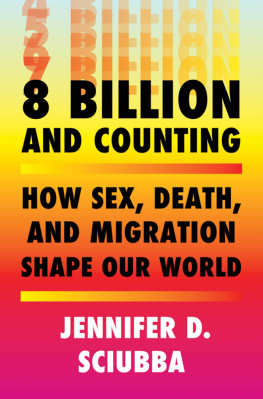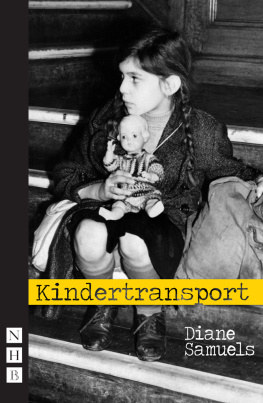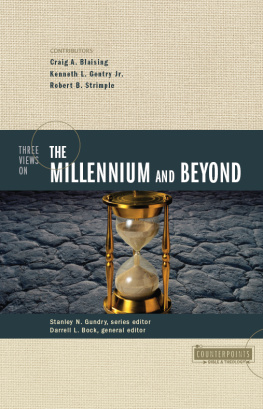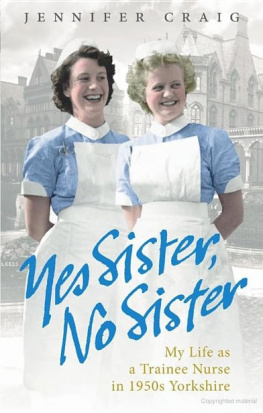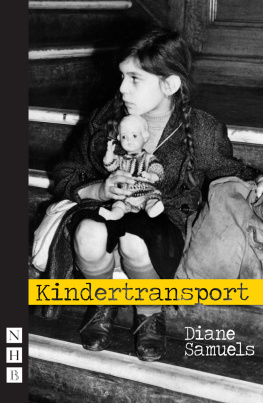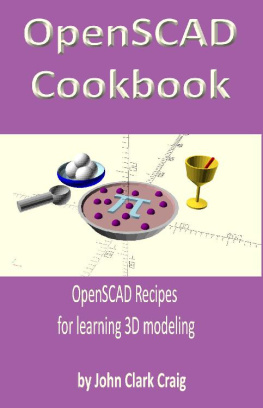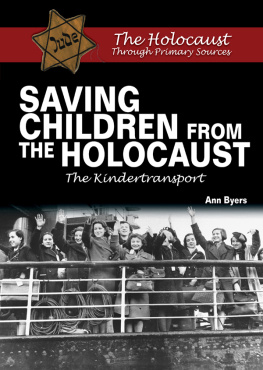This book is a publication of
Indiana University Press
Office of Scholarly Publishing
Herman B Wells Library 350
1320 East 10th Street
Bloomington, Indiana 47405 USA
iupress.indiana.edu
2019 by Jennifer Craig-Norton
All rights reserved
No part of this book may be reproduced or utilized in any form or by any means, electronic or mechanical, including photocopying and recording, or by any information storage and retrieval system, without permission in writing from the publisher. The paper used in this publication meets the minimum requirements of the American National Standard for Information SciencesPermanence of Paper for Printed Library Materials, ANSI Z39.48-1992.
Manufactured in the United States of America
Library of Congress Cataloging-in-Publication Data
Names: Craig-Norton, Jennifer, author.
Title: The Kindertransport : contesting memory / Jennifer Craig-Norton.
Description: Bloomington, Indiana : Indiana University Press, [2019] | Series: Studies in antisemitism | Includes bibliographical references and index.
Identifiers: LCCN 2018049715 (print) | LCCN 2018050672 (ebook) | ISBN 9780253042248 (e-book) | ISBN 9780253042200 (cl : alk. paper) | ISBN 9780253042217 (pb : alk. paper)
Subjects: LCSH: Kindertransports (Rescue operations) | World War, 1939-1945JewsRescueGreat Britain. | JewsGermanyHistory1933-1945. | Jewish childrenGermanyBiography. | Jewish refugeesGreat BritainBiography. | Jewish childrenGreat BritainBiography.
Classification: LCC D804.6 (ebook) | LCC D804.6 .C73 2019 (print) | DDC 940.53/1835083dc22
LC record available at https://lccn.loc.gov/2018049715
1 2 3 4 5 24 23 22 21 20 19
T HIS PROJECT HAS BROUGHT ME INTO CONTACT WITH a very large number of people around the globe, all of whom deserve thanks and appreciation. Foremost, my profound gratitude to the many former Kinder and their families who have shared their personal and often painful stories, opened their homes, and lent precious documents to me. In particular, I must express my deepest gratitude to Herbert Haberberg, who graciously and over many meals and cups of tea answered all my questions, lent me his parents letters and precious photographs, and allowed his life story to scaffold my narrative. My deepest gratitude to others with whom I met: Henry Alpern, DB, Gerald Lieder, Rebecka Krenzler Scherer, and Grete Dukat Sole; and to those with whom I spoke remotely or wrote: Yetty Herman Sachs, Gerd Korman, Manfred Lindenbaum, and Fanny Obst. All have been unfailingly generous in sharing their stories with me, and their contributions have been invaluable.
Special thanks to Deborah Clements and Helen Kamiel for providing friendship and Josef Kamiels records; to Henry (Heinz) Danzigers sons, Michael and Sebastian, who lent me their fathers letters and photographs; and to Selma Hermans daughters, Rosalind Marks and Ruth Winterton, for their unflagging support and for the loan of documents, photographs, and their grandparents letters. My warmest thanks to Valma Pachtman and Miriam Frankel for their support and friendship and for loaning Edward Pachtmans memoirs and to Sandy Potashnick for her memories and for lending me her mothers recorded testimony. Thanks, too, to Irene Reti, for lending me Thea Feliks Edens interviews, for her insights about Thea, and for her warm encouragement throughout. My appreciation also extends to Nigel Steele for meeting me in Southampton and sharing memories of his mother, Ewa Mohr, and to Konrad Soyez for writing her story and sharing it with me and for making the effort to find me.
The extended Lieder family, and particularly Leah Wolf, whose enthusiasm for my project resulted in the location of five Polish Kinders families, deserve special thanks. Their warm hospitality in Jerusalem will not be forgotten. The Laulicht and Pachtman families also graciously welcomed me into their homes when I visited Israel, and their interest in my research has provided enormous encouragement. Many thanks to Bernard Rosenfeld and his daughters, Michelle, Helen, and Rene, who generously hosted me in Houston and shared their memories of Sonia Baranska Rosenfeld, along with photographs and documents that have greatly enriched my research. The photographs and information provided by Simon Baronowitz and his mother and by Lynda ODer have also proved invaluable to this book. Finally, I need to express my appreciation for the contributions of Paula Waldhorns daughter Shula and Ida Najmans daughter Sandy, whose descriptions of their mothers experiences, though painful to recount, provided such important insights.
This book never would have reached completion without the mentorship and encouragement of Tony Kushner. No amount of thanks is enough for the academic, material, and intellectual support and friendship he has provided over the years. I do not have an adequate way to express my appreciation to my superb translator, Margy Walter, for her elegant and sensitive translations. Without her, there would be no concluding chapter. My rendering of the parents letters, which I hope does them justice, is the only way I can hope to repay her for her unbelievable act of generosity. Thanks also to her army of helpers, as well as to my dear friend Mimi Schneiderman, who did Hebrew translations for me.
I have received invaluable support from the Parkes Institute for the Study of Jewish/non-Jewish Relations at the University of Southampton and from the British Academy Postdoctoral Fellowship Program, which has helped me to bring this book to completion. In particular, Id like to thank Shirli Gilbert and Joachim Schloer for their support and guidance along the way. I also received crucial support from a Saul Kagan Claims Conference Fellowship in Advanced Shoah Studies. My sincere thanks go to the archivists in the University of Southamptons Hartley Library Special Collections for their help and guidance over many months and years. Special thanks to the Wiener Library staff, especially to Howard Falkson, for being ever helpful and supportive, and to Christine Schmidt, for her guidance with the complex ITS archive. I would also like to thank the West London Synagogue, World Jewish Relief, and the Shoah Foundation for permission to use and quote from their archives. Special thanks must also go to Alvin Rosenfeld and Mark Roseman at Indiana University and Dee Mortensen, my extraordinarily helpful and supportive editor at Indiana University Press for reading my manuscript and guiding it through several rewrites. I am especially grateful for the reviewers who offered such constructive and insightful advice and suggestions. Finally, thanks to Leigh McLennon and her team for guiding me through the copyediting process and helping to produce such a superb-looking final product.
Dozens of others have helped me along the way, including colleagues who shared their invaluable scholarship at the KT80 Symposium, held in London in January 2019. My deepest thanks to friends and family far and near who have provided steady support, especially Liz and Jack Igra, who hold a special place in my heart. I will always be grateful to Stephen Feinberg, who started me on this journey, and to Mona Siegel and Katerina Lagos, whose faith inspired me to take the next step. Heartfelt thanks to my late father, Richard Aberley, for a love of history and a lifetime of encouragement, and to my sons, Russell and Mitchell Norton, for their understanding as I followed my passions. Tom, you have been with me throughout this journey, listening patiently to breathless accounts of various discoveries, reading and rereading endless drafts, and journeying across the world with me to meet my Kinder, as we have come to know them. Thanks to you, above all.



